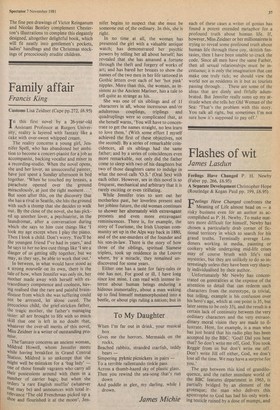Family affair
Francis King
Customs Lisa Zeidner (Cape pp.272, £6.95) in this first novel by a 26-year-old Assistant Professor at Rutgers University, reality is layered with fantasy like a cake with over-sweet whipped cream.
The reality concerns a young girl, Jennifer Spell, who has abandoned her ambition to become a concert-pianist for a job as accompanist, backing vocalist and mixer in a recording-studio. When the novel opens, she and her lover, an unsuccessful painter, have just spent a Sunday afternoon in bed together. 'When he touched my breasts, a parachute opened over the ground miraculously, at just the right moment .. But soon after this, on the discovery that she has a rival in Seattle, she hits the ground with such a thump that she decides to walk out. By the close of the novel, she has picked up another lover, a psychiatrist, in the laundromat, after a conversation during which she says to him cute things like `I look my age except when I play the piano. Then I look a child. Don't worry. You'll be the youngest friend I've had in years,' and he says to her no less cute things like 'I see a danger of us getting silly together, but we may, as they say, be able to work that out.'
In between, in what would have stood as a strong nouvelle on its own, there is the tale of how, when Jennifer was only six, her mother made away with herself with extraordinary competence and coolness, having realised that the rare and painful braindisease from which she was suffering could not be arrested, let alone cured. The Precocious child, the grief-stricken father, the tragic mother, the father's managing sister: all are brought to life with so much Skill that one is left in no doubt that, Whatever the over-all merits of this novel, Miss Zeidner is a writer of outstanding promise.
The 'fantasy concerns an ancient woman, Mildred Howell, whom Jennifer meets While having breakfast in Grand Central Station. Mildred is so unkempt that she might well be mistaken for a 'bag lady' — one of those female vagrants who carry all their possessions around with them in a number of carrier bags; but when she orders 'a rare English muffin' (whatever that may be) and announces with total irrelevance 'The old Frenchman picked up a Shoe and flourished it at the moon', Jen nifer begins to suspect that she must be someone out of the ordinary. In this, she is right.
In no time at all, the woman has presented the girl with a valuable antique watch; has demonstrated her psychic powers by telling her all about herself; has revealed that she has amassed a fortune through the theft and forgery of works of art; and has bared her breasts to show the names of the two men in her life tattooed in Gothic letters over each of her 'hot pink' nipples. More than this, the woman, as insistent as the Ancient Mariner, has a tale to tell quite as strange as his.
She was one of six siblings and of 11 characters in all, whose incestuous and/or adulterous couplings, triplings and quadruplings were so complicated that, as she herself warns, 'You will have to concentrate to get the names straight, no less learn to love them.' (With some effort I myself achieved the first of these objectives, not the second). By a series of remarkable coincidences, all six siblings had the same father; and by a series of coincidences even more remarkable, not only did the father come to sleep with two of his daughters but two of those daughters came to indulge in what the novel calls `O.S.' (Oral Sex) with each other. However, sex in this novel is so frequent, mechanical and arbitrary that it is rarely exciting or even titillating.
While Jennifer tries to sort out her motherless past, her loverless present and her jobless future, the old woman continues to shower her alternately with extravagant presents and even more extravagant reminiscences. There is, for example, the story of Tourisme, the Irish Utopian community set up in the Alps way back in 1880, and of the axe-murders of the founder and his son-in-law. There is the story of how three of the siblings, spiritual Siamese triplets, took up residence in the Louvre where, by a miracle, they remained undiscovered for some years.
Either one has a taste for fairy-tales or one has not. For good or ill, I have long since lost mine. I can read with intense interest about human beings enduring a hideous immortality, about a man waking up to find himself metamorphosised into a beetle, or about pigs ruling a nation; but in each of these cases a writer of genius has found a potent extended metaphor for a profound truth about human life. If, however, Miss Zeidner or her millionairess is trying to reveal some profound truth about human life through these coy, skittish fantasies, then I have been unable to crack the code. Since all men have the same Father, then all sexual relationships must be incestuous; it is only the imagination that can make one truly rich; we should view the world not as residents in it but as tourists passing through... These are some of the ideas that are dimly and fitfully adumbrated. But Jennifer really sums up my attitude when she tells her Old Woman of the Sea: 'That's the problem with this story. You talk all right, but sometimes I'm not sure how it's supposed to pay off.'


























































 Previous page
Previous page